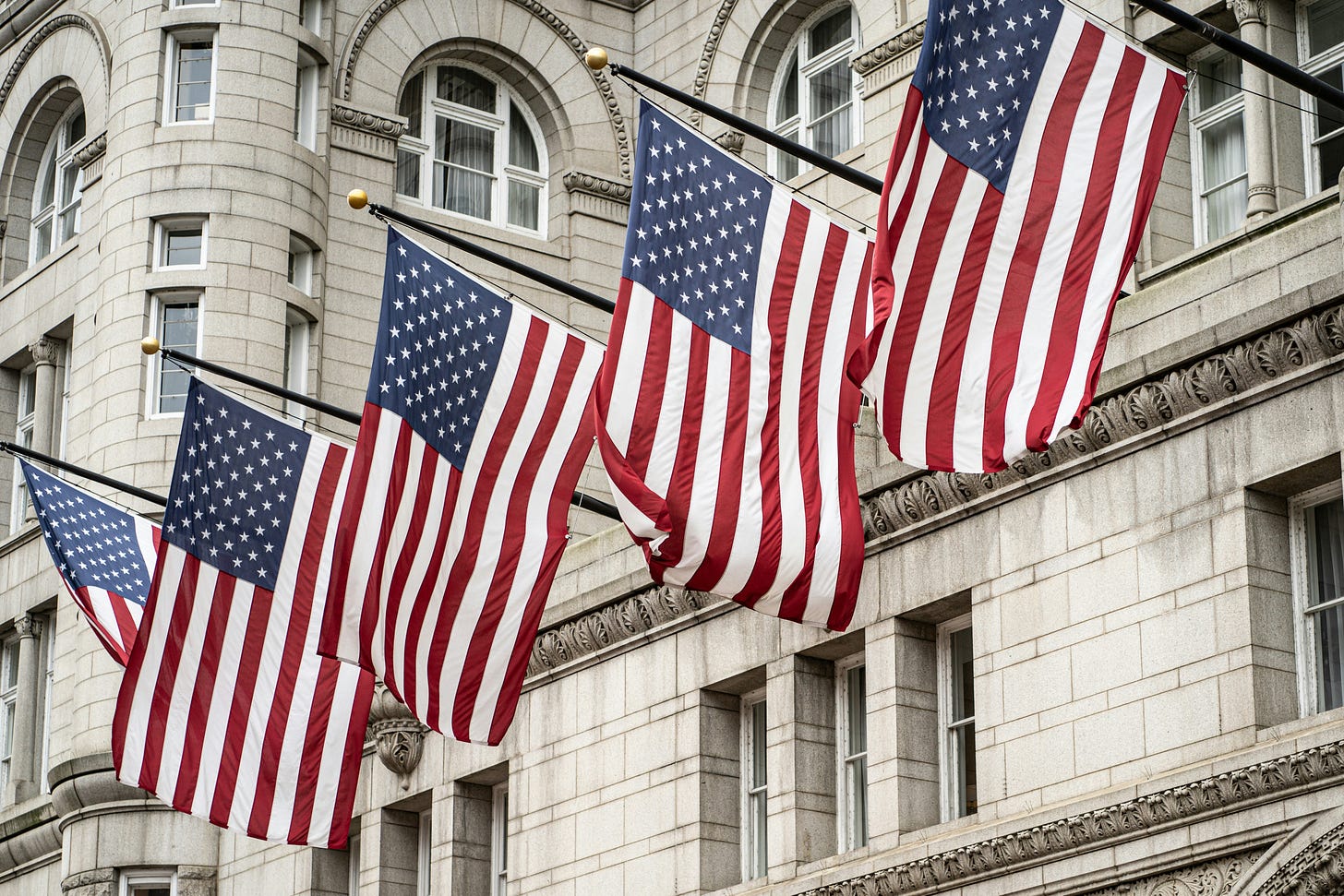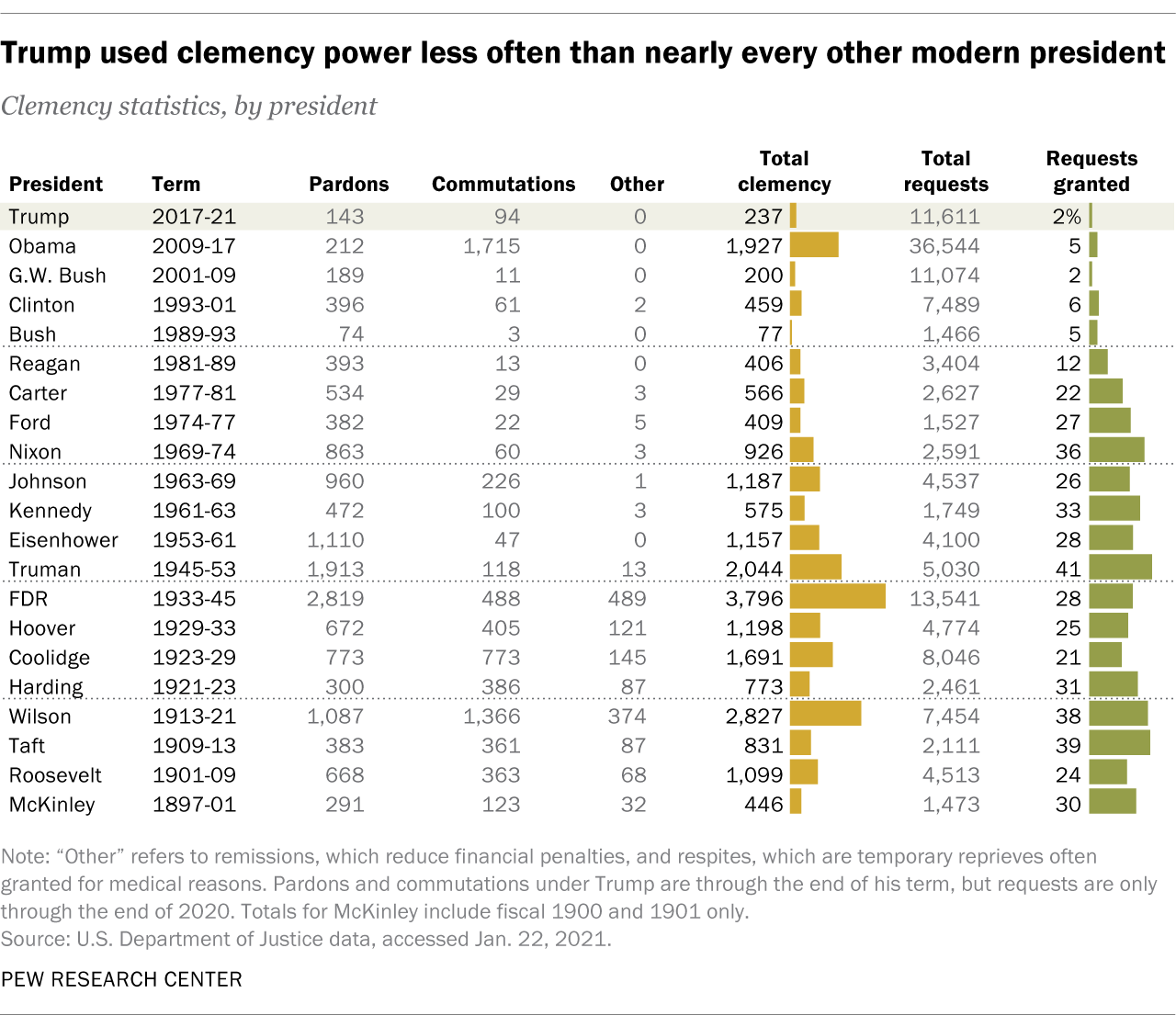Last time we considered several noteworthy aspects of President Biden’s grant of a sweeping pardon to his son Hunter. The president gave the younger Biden clemency for not only the various tax and gun charges of which he had been convicted or pled guilty to, but for any federal crime he may have committed since 2014.
Today we’ll take a broader look at President Biden’s exercise of the pardon power to date.
Photo by Christian Lucas on Unsplash
Biden by the numbers
Pardons Granted by President Joseph Biden (2021-Present)
Through December 12, 2024, Biden has delivered 65 pardons by my count. That number will almost certainly grow before his term of office ends on January 20, 2025.
Commutations Granted by President Joseph Biden (2021-Present)
In that same period, he has granted 136 individual commutations (reduction of sentence)1 plus a mass commutation of the sentences of 1,499 individuals, which we’ll get to in a moment. Again, we can expect this number to rise before Biden leaves office.
With that caveat, we’ll go ahead and compare Biden’s use of executive clemency with his predecessors.
The Pew Research Center prepared a report2 at the end of President Trump’s term from which we borrow the below graphic. I’m sure Pew will update this after Biden leaves office.
Apparently good records on pardons have only been kept around 1900, which is good enough for our purposes. Biden’s 65 pardons so far would put him at the bottom of the list as of today, behind the first President Bush’s 74 pardons.
Franklin Roosevelt granted the most pardons — 2,819 — during his three full terms and part of a fourth.
In commutations, Biden stands at 1,635, just behind President Obama, who commuted sentences for 1,715 individuals. Once and future President Trump was much more sparing in granting pardons (143) and commutations (94) during his first term.
Biden’s record, barring a massive surge of pardons in the next month, is in line with the overall trend of presidential clemency, and tracks closely with the record of President Obama, with whom Biden served as vice president.
What about the draft dodgers?
The astute reader will note that President Carter’s 1977 grant of clemency to more than 200,000 (and possibly more than half a million) Vietnam draft dodgers is not on the chart. That amnesty would certainly put him in a solid first place in the modern pardon rankings.
It is not on the chart because Carter granted that broad pardon by executive proclamation, not through the individual pardon process. All the pardons we’ve discussed are for named individuals. The Carter amnesty for draft dodgers, along with an earlier, more limited and conditional clemency by President Ford, was granted to a category of persons:
I, Jimmy Carter, President of the United States, do hereby grant a full, complete and unconditional pardon to: (1) all persons who may have committed any offense between August 4, 1964 and March 28, 1973 in violation of the Military Selective Service Act or any rule or regulation promulgated thereunder; and (2) all persons heretofore convicted, irrespective of the date of conviction, of any offense committed between August 4, 1964 and March 28, 1973 in violation of the Military Selective Service Act, or any rule or regulation promulgated thereunder, restoring to them full political, civil and other rights.3
The DOJ doesn’t include pardons granted via proclamation to broad categories of people in their pardon data. On that technicality, FDR retains the top spot in handing out pardons.
Biden’s record single day commutation
President Biden commuted the sentences of 1,499 people on December 12, 2024, which is claimed to be the largest single-day act of clemency in modern U.S. history. (Again ignoring Carter on a technicality.)
What was this all about?
According to the White House fact sheet:
The nearly 1,500 individuals who received commutations today have been serving their sentences at home for at least one year under the COVID-era CARES Act. These Americans have been reunited with their families and shown their commitment to rehabilitation by securing employment and advancing their education.
The Coronavirus Aid, Relief, and Economic Security (CARES) Act was a 2020 law that temporarily broadened the Bureau of Prison’s discretion to transfer federal prisoners to home confinement. Normally that was only possible in the final six months or 10% of a prisoner’s sentence, whichever was shorter. Given the COVID-19 emergency conditions, these limitations were waived.
Prisoners were considered for home confinement based on a variety of factors, including:
Age and vulnerability to COVID-19 (e.g., underlying health conditions).
Risk of recidivism and public safety concerns.
Time served and proximity to the end of their sentence.
Behavior while in custody.
All of the 1,499 commutations were for prisoners confined at home who were in the final months of their sentence, with 6 months or less to go.
What then, was the point, since they would all end their sentences soon?
The cynic might suggest that President Biden wanted to make a clemency splash to mute criticism of his nepotistic pardon of Hunter Biden.
If so, it might have seemed like an easy PR win. Unfortunately, several of these commutations proved controversial:
Michael Conahan: A former judge involved in a "kids-for-cash" scandal, Conahan was convicted for his role in a scheme that funneled juvenile defendants into for-profit detention centers in exchange for kickbacks. AP News
Rita Crundwell: The former comptroller of Dixon, Illinois, Crundwell was convicted of embezzling $54 million from the city over two decades, representing the largest municipal fraud in U.S. history. AP News
The victims of these and several other commutees among the 1,499 were outraged at their receiving clemency, even if they were set to complete their sentences soon.
The White House staff apparently did not inquire into the specifics of each case but simply put people on the list if they had received home confinement per the CARES Act.
Biden’s categorical clemency
Just as Presidents Ford and Carter issued categorical pardons or amnesties for violations of the Selective Service Act, President Biden has also made use of categorical pardons.
Going back to that White House fact sheet:
In addition to these individual clemency actions, President Biden has issued a number of categorical pardons to certain groups of people. The President has used categorical clemency more than any of his predecessors, which has allowed him to widely and systemically respond to historic injustices. His bold and unprecedented categorical actions, broadly outlined below, include the following:
In October 2022, the President issued a full, complete, and unconditional categorical pardon for the offense of simple possession of marijuana.
In December 2023, the President issued another proclamation that expanded earlier relief for the offenses of simple possession of marijuana, attempted simple possession of marijuana, or use of marijuana, regardless of whether the individual had been charged with or prosecuted for the offenses on or before the date of the proclamation.
In June 2024, the President issued a full, complete, and unconditional categorical pardons to certain former military service persons convicted of offenses based on their sexual orientation, specifically unaggravated offenses based on consensual, private conduct with persons age 18 and older occurring between May 31, 1951, and December 26, 2013, as well as attempts, conspiracies, or solicitations of such conduct.
My guess is that these categorical pardons were done through proclamation, following the Carter model, but I don’t care enough to look that up.
If you scroll through the individual pardon and commutation lists I linked earlier, you’ll see that many grants of clemency were for marijuana related offences.
These categorical pardons highlight one of the important uses of executive clemency. When criminal laws for particular offenses are repealed or the statutory penalties are greatly reduced, some may consider it unjust for people who were convicted and sentenced under the previous harsher provisions to be left languishing behind bars.
Whatever one’s opinion on these topics, the laws and prevailing societal attitudes on marijuana use and military service by non-heterosexuals have greatly changed in recent years. With the pardon power, a president can restore some balance to an inequity in how those convicted before or during that change of laws are treated.
Clemency raincheck
We’ll stop there for today. I expect there will be more pardon activity from President Biden in the coming weeks, so we’ll visit this topic again.
Until next time, Conquer the Day!
Again by my count. I may have skipped or double counted while scrolling down the page. Feel free to double check.
Trump used his clemency power sparingly despite a raft of late pardons and commutations
If you’re interested in the topic, this is a nice little summary of recent trends in pardons and commutations.




